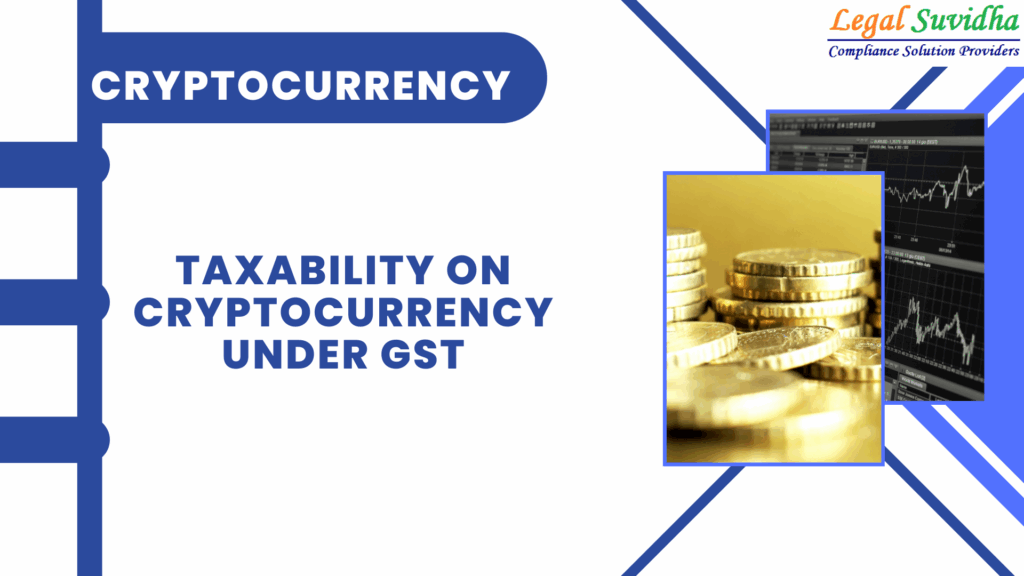Cryptocurrency Taxable under GST is still being determined. However, as per GST council meeting dated 14th may 2021, it is announced that trading of Cryptocurrency will be taxable under GST. The GST council has decided to impose 18% GST on the purchase or sale of Cryptocurrency.
TAXATION OF CRYPTOCURRENCY UNDER GST
Virtual digital asset means any form of information or code representing value exchanged and can be used in any financial transaction. The asset can be stored or transferred electronically.
Virtual digital assets also include non-fungible tokens and any other digital asset specified by the central government but not Indian or foreign currencies
The meaning and scope of supply under GST can be understood in terms of following parameters, which can be adopted to characterize a transaction as supply:
- Supply of goods or services or both(Supply of anything other than goods or services does not attract GST).
- Supply should be made for consideration.
- Supply should be made in the course or furtherance of business.
- Supply should be taxable supply.
Who must pay GST on supply crypto or digital assets and GST rate, HSN code?
- Crypto or digital assets can be obtained through crypto exchanges or mining, i.e. self-generation. As per GST Law, the supplier of goods levies and collects GST.
- Accordingly, the seller of crypto or digital assets needs to pay GST and collect from their buyer irrespective of the sale executed through exchanges or any other means.
- Currently, there is no particular HSN Code and rate for digital assets; hence we may refer to HSN code 960899 named “other miscellaneous article”, stating a rate of 18% (highest among this category).
- Further, only those persons will be liable to pay GST whose sales/turnover crosses the threshold limit of Rs 40 lakhs during the financial year or who have registered themselves under GST voluntarily.
- We all have this question of whether Crypto Currency falls under the Definition of “Goods or Services”
- Cryptocurrency falls within the meaning of ” Goods or Services” under the GST laws. This classification would further be important to understand the treatment of transactions in terms of provisions such as place of supply , time of supply , rate of tax, valuation,reverse charge, etc.
Input tax credit claims for GST on crypto or digital assets
Under GST Law, the Input tax credit can only be availed if the goods or services are used for business purposes.
GST levied on the purchase of crypto or digital assets or any other goods or services used for dealing in crypto, or digital assets can be used as an input tax credit. Other goods or services may include broker commission, consultancy services, software, the cost to generate digital assets, etc.
WHETHER CRYPTOCURRENCY IS SECURITIES
SECTION 2(h) of the Securities Contract Regulation Act ,1956
(i) shares, scrips, stocks, bonds, debentures, debenture stock or other marketable securities of a like nature in or of any incorporated company or other body corporate;
(ia) derivative;
(ib) units or any other instrument issued by any collective investment scheme to the investors in such schemes;
(ic) security receipt as defined in clause (zg) of section 2 of the Securitisation and Reconstruction of Financial Assets and Enforcement of Security Interest Act, 2002 (54 of 2002);
(id) units or any other such instrument issued to the investors under any mutual fund scheme;
(ida) units or any other instrument issued by any pooled investment vehicle;
(ie) any certificate or instrument (by whatever name called), issued to an investor by any issuer being a special purpose distinct entity which possesses any debt or receivable, including mortgage debt, assigned to such entity, and acknowledging beneficial interest of such investor in such debt or receivable including mortgage debt, as the case may be;
(ii) Government securities;
(iia) such other instruments as may be declared by the Central Government to be securities; and
(iii) rights or interests in securities;










